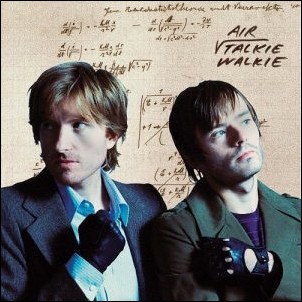Modern romantic sentiments ‘Air’ed on French duo’s most recent album

Image: Modern romantic sentiments ‘Air’ed on French duo’s most recent album:Photo courtesy of amazon.com:
March 17, 2004
For a time, you couldn’t see Air’s name without the obligatory “(French Band)” following it. Presumably, the deo of Jean-Benoit Dunckel and Nicolas Godin wanted to draw a distinction between themselves and other “electronic groups” (a horrifyingly broad pigeonhole not worth subscribing to) of the late ’90s — a distinction going beyond the one their music created on its own. Despite their inception across the Atlantic, Air easily slipped into the psyche of America. Following 1998’s acclaimed “Moon Safari,” they wrote the soundtrack to “The Virgin Suicides,” by Sophia Coppola, with whom they teamed up again for last year’s Academy Award winning “Lost in Translation.”
The song they contributed to that soundtrack, “Lost in Kyoto,” is also the last song on Air’s newest opus, “Talkie Walkie.” Like the movie, it is a subtly romantic and overtly dazzling song, and categorically follows in the direction the band seems to be taking of late.
With songs like “Cherry Blossom Girl” and “Venus,” Air approaches a near-perfect accessibility. This is electronic-based music for people who think of themselves as live-instrument elitists. The arrangements are poppy, but intricately layered to the point of being smarter than the average hit-makers.
“Alpha Beta Gaga” epitomizes this. Against a background of sampled street sounds and spritely melody, Dunckel’s whistling is organic. It seems that it has always existed in your head, that Air simply hit “play” on the hi-fi stereo of your mind.
“Biological” is a classic Air song, with slow progressions creating a constantly rising and never climaxing aural soundscape. It simultaneously calms and energizes. This is the type of song reserved for headphoned people-watching, guaranteed to make the world appear to be plugged into the same pedestrian beat. As is typical of “Talkie Walkie,” the song’s lyrics touch on the general idea of love. The genius of the track, however, is the modern angle applied to a traditional theme. Five minutes in, more and more sounds are added to the rhythm and harmony, creating a texture that perfectly complements the chants of “biological…”
Modernity of love seems an apt description of the overall feel of the album. It is warm and natural, but colored with (successfully) contrived combinations of sounds. The lyrics of “Biological” touch on the genetics of attraction, the scientific side of being meant for one another. Even the title of the album denotes an immediate but dividing nature within modern communication.
In an interview with Earwax, Dunckel and Godin said the album is meant to speak to their girlfriends. The album does, in fact, carry a highly personal feel to it. The usually anonymous pair are actually pictured on the cover. They look French, and sound like it too. The piano line in “Venus” recalls somber cafe patrons and bereted lovers parting on a Parisian bridge.
Usually when a foreign band uses English for their lyrics, they give the impression of targeting the fickle and demanding American Their use of English is successful in a way that may be unique to “electronic” music. The song “Universal Traveller” is a good example. The sounds of the song are concise; the lyrics are delivered in a staccato sing-song voice that only a French accent could provide.
Like so much art coming from abroad, “Talkie Walkie” could appeal to the masses simply because it doesn’t sound like what is coming out of America. There is something vaguely exotic about buying an album by a French band. But whether you buy it for the “hip” appeal or for the soft orchestration of instruments and electronically arranged beats, “Talkie Walkie” will quickly become a soundtrack for your life. The world takes on a beautiful face when this album plays, making it one of the best releases of 2004 thus far.






































































































































